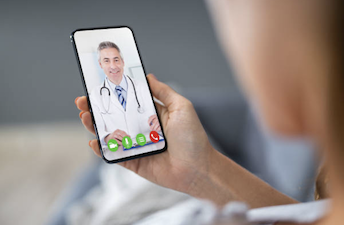5 Reasons To Make A Virtual Doctor's Appointment
Jun 02, 2021 18:57
In recent years, health insurance has been extending its services to virtual doctor's appointments. More recently, however, telehealth/telemedicine has positioned itself as basically an essential service as the world locked down and remote meetings/work became the norm.

Since it's more widespread (and will continue to grow after the end of the current pandemic), getting a virtual doctor's appointment is a great idea for many people. Sometimes, taking the time to see a doctor for non-emergency concerns falls by the wayside as you deal with other matters throughout your day. Recommendations for routine doctor's visits vary by age group, and seeing one virtually helps you get professional medical advice and treatment from the convenience of your home. Here are five good reasons to make a virtual doctor's appointment for your next non-emergency visit.
Making Appointments Is Simple And Convenient
If you're anything like the rest of us, you probably don't enjoy going through the ritual of starting to (and keeping!) a doctor's appointment. It can be difficult to align your schedule with that of the physician. To compound things further, you may only need a prescription refill for a chronic condition or just need a quick checkup/follow-up. In those situations, it makes sense to go the online doctor route. With telemedicine, a doctor’s appointment is usually just a click away. Find your desired telemedicine practitioner and take a look at their list of doctors available in your state. They’ll match you with various doctors and you can often book an appointment on the same day. After the appointment, the doctor might prescribe medicine, which you can pick up at a local pharmacy.
They're Professional And Reputable.
Telemedicine isn't just some private organization; it's a regulated industry. Doctors are actual, licensed, professional practitioners of medicine. Every state has its own procedures for licensing and it varies by state. A telemedicine service will confirm your state of residence and try to match you with a doctor located in your state. If the doctor is located in a different state, then additional paperwork will often be required. Since it’s regulated and legitimate, the doctors are reputable and will treat patients in a professional manner 100% of the time.
They Treat Most Non-Emergency Conditions
What can you be treated for by a virtual doctor? Moreover, why should you elect to see a doctor online instead of traveling to your local doctor’s office? As we mentioned previously, it’s quite convenient. But beyond that, virtual doctors create a comfortable, effective environment for treating various non-emergency conditions. There’s a remarkably versatile selection of treatments they can provide, including:
● Consultation
● Urgent care
● Acne
● Quick diagnosis for some conditions
● Sinus infections
● Colds
● Flu
● Asthma
● Allergies
● Urinary Tract Infections (UTI)
● Rashes
● Primary care
● Medication management
● Prenatal care
● Diabetes care
Counseling and mental health services are also available through most telemedicine practitioners. These services can address concerns related to depression, stress, anxiety, panic, and other mental health issues from the safety and comfort of your own home. Online doctors cannot treat severe or life-threatening conditions, so if you’re experiencing severe trauma or a potentially life-threatening condition—including head trauma, heart attack, stroke, severe abdominal pain, and other serious conditions—you’ll want to head to the emergency room.
It’s Easy To Prepare Of The Appointment
The telemedicine organization should provide information for connecting with the doctor. You may need to download conferencing software for the appointment. Prior to the appointment, make sure your device is in good, working order. Ensure the camera functions properly, your speakers work/are set at a comfortable volume, and that your microphone is ready to go. Test your internet connection and find the place with the strongest Wi-fi or mobile data signal in your home. Plug the device’s power adaptor into the wall or make sure it's fully charged before starting the appointment and be sure to do all of this in a relatively quiet, comfortable space. Write down any questions or concerns you have and inform the doctor if someone else is in the room for privacy reasons. Virtual doctors keep your privacy in mind and adhere to protecting your rights and privacy under HIPPA, so you can rest easy knowing your doctor’s appointment is private and professional.
Most Insurance Covers It

Depending on your insurance provider, telemedicine visits can be covered in a few different ways. While some insurance policies like those provided by Aetna, Blue Cross Blue Shield, Humana, and United Healthcare usually have some telemedicine coverage baked into their plans, you'll need to check with your plan to find out if the visit is covered free of charge or requires a premium. With other insurances, the cost can vary based on what's being treated, with an average cost of around $79. If you don't have insurance, don't despair; much like an urgent care center, a reputable telemedicine organization usually offers a reasonable fee for using their services – even if you aren’t insured. In this manner, you can take full advantage of these valuable services without worrying about breaking the bank.







































































